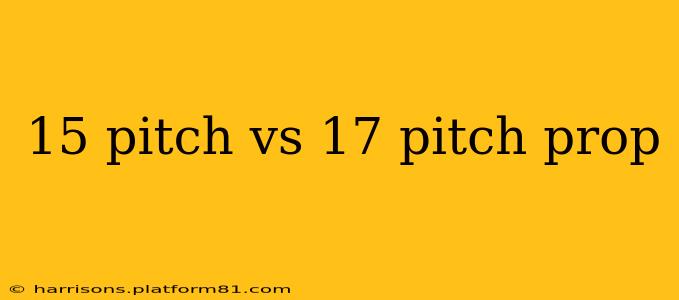Choosing the right propeller for your boat is crucial for performance, fuel efficiency, and overall boating experience. One key decision involves selecting the pitch of the propeller. This article delves into the differences between a 15-pitch and a 17-pitch propeller, helping you understand which might be best for your needs.
What Does Propeller Pitch Mean?
Before we compare 15-pitch and 17-pitch propellers, let's clarify what "pitch" actually means. Propeller pitch represents the theoretical distance the propeller would travel in one revolution if it were moving through a solid medium, like a screw in wood. A higher pitch number indicates a larger theoretical distance traveled per revolution. This directly impacts your boat's speed and RPM.
15-Pitch Propeller: Characteristics and Applications
A 15-pitch propeller generally offers:
- Higher RPM at a given speed: This means your engine will rev higher to achieve the same speed compared to a higher-pitch propeller.
- Faster acceleration: The lower pitch allows for quicker acceleration from a standstill.
- Better performance in shallower water: A lower pitch is often more suitable for navigating shallow areas. The lower thrust per revolution reduces the risk of cavitation.
- Better hole shot: For boats that need quick acceleration out of the hole, such as fishing boats or ski boats, a 15-pitch propeller can be advantageous.
17-Pitch Propeller: Characteristics and Applications
A 17-pitch propeller, on the other hand, typically provides:
- Lower RPM at a given speed: Your engine will run at lower RPMs to achieve the same speed as with a 15-pitch propeller. This can lead to better fuel economy.
- Higher top speed (potentially): The increased pitch allows the propeller to move more water per revolution, potentially resulting in a higher top speed, although this depends on other factors.
- Better fuel efficiency (potentially): Lower RPMs often translate to better fuel efficiency. However, this is not always guaranteed and depends on various factors including engine load.
- Cruising efficiency: A 17-pitch prop is often ideal for cruising applications where fuel economy is prioritized.
Which Pitch is Right for Me? 15 vs. 17
The "best" pitch depends heavily on your specific boat, engine, and intended use. There's no one-size-fits-all answer. Several factors influence the optimal pitch:
- Boat size and weight: Heavier boats generally benefit from a lower pitch propeller for better acceleration.
- Engine horsepower: More powerful engines can often handle higher-pitch propellers.
- Desired performance: Prioritizing top speed suggests a higher pitch, while emphasizing fuel economy leans towards a lower pitch.
- Hull design: The hull's shape and design significantly impact propeller performance.
How to Determine the Right Propeller Pitch
The most accurate way to determine the ideal propeller pitch for your boat is through experimentation or consultation with a marine propeller specialist. They can assess your boat's specifications and help you select the optimal pitch for your needs. They may also consider factors like:
- Diameter: The diameter of the propeller is also a crucial factor in performance.
- Number of blades: The number of blades impacts efficiency and performance characteristics.
- Material: The propeller material (aluminum, stainless steel) affects durability and performance.
What if my engine is running too high or too low RPMs?
High RPMs: If your engine consistently runs at very high RPMs under load, it may indicate that you need a higher-pitch propeller.
Low RPMs: Conversely, if your engine is struggling to reach a desirable speed and RPMs are constantly low, a lower-pitch propeller might be more suitable.
Conclusion: The Importance of Proper Propeller Selection
Choosing the right propeller pitch significantly impacts your boat's performance, fuel efficiency, and overall driving experience. Consult with a marine propeller expert to find the ideal pitch for your specific needs, ensuring you get the most out of your boating investment. Remember that this is just a starting point, and professional advice is essential for optimal results.
